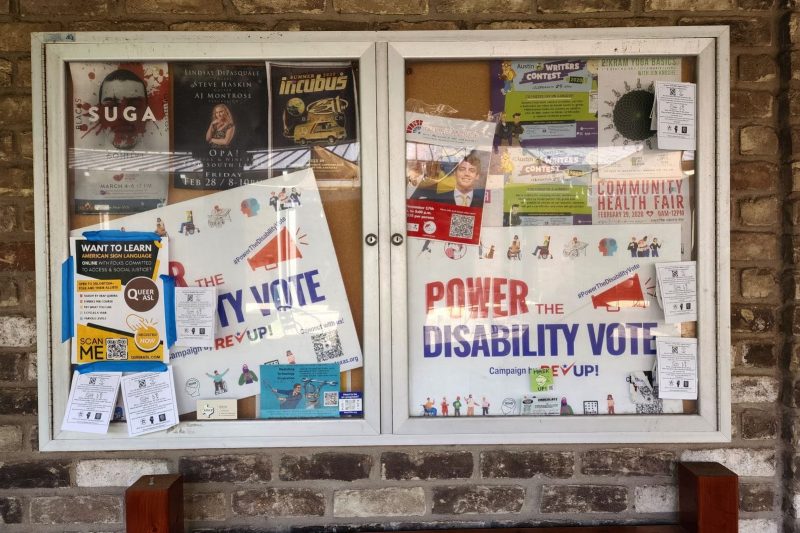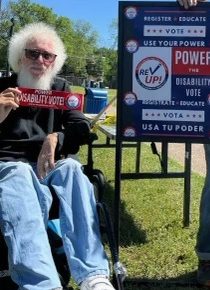Disability Rights Groups Celebrate Ruling That Improves Accessibility for Voters — for Now
By Madeline de Figueiredo
Reporting Texas

Photo courtesy of Thor Armbruster/ADAPT of Texas
Voters with disabilities could get expanded access to the ballot this election season after a federal judge struck down Texas laws limiting voter assistance.
The Oct. 11 ruling has yielded cautious celebration from activist and advocacy communities on the eve of early voting, which begins Monday. But the state might appeal the decision in time to thwart voter assistance efforts.
U.S. District Judge Xavier Rodriguez of San Antonio ruled that Texas’ 2021 election law violated the Voting Rights Act by requiring anyone who assists a voter to sign an oath under threat of perjury and prohibiting compensation for anyone providing voter assistance. Rodriguez said those provisions could not be enforced.
“The ruling protects the rights of Texas voters with disabilities to get the assistance they need without fear of prosecution,” said Bob Kafka, the state coordinator for REV UP Texas, one of the groups that challenged the law.
Kafka, who experiences limited mobility from a spinal injury, said the 2021 election law left voters with disabilities facing the unthinkable choice of risking felony charges for their assistants or giving up the help they need to vote.

Disability rights advocate Bob Kafka played a key role in striking down portions of a Texas election law that limited assistance to disabled voters. Photo courtesy of Thor Armbruster/ADAPT of Texas
“Usually the disability vote is not taken seriously,” Kafka said. “We’ve been trying to make the case that the disability vote can actually be very influential.”
The ACLU of Texas said it regards the law banning compensation for those assisting voters to be currently unenforceable. =
The judge determined that, due to the proximity of the election, changes to forms and ballot envelopes cannot be implemented for this November’s election. “Even though it is present as written, the attorney general’s office or local prosecuting attorneys can’t under that order prosecute someone for violating the oath,” said Ashley Harris, a staff attorney with the ACLU of Texas.
The 2021 Texas Legislature passed the voter assistance restrictions in Senate Bill 1, formally known as the Election Integrity Protection Act of 2021. The law followed Republican claims of election irregularities in the 2020 presidential election.
The bill’s primary sponsor, state Sen. Bryan Hughes, R-Tyler, said in a 2023 interview that the crackdown on voter assistance stemmed from concerns about “paid political operatives in the voting booth influencing voters.”
“Mail-in ballots (are) an important tool for folks who are disabled,” Hughes said. “But states are pushing for universal mail-in ballots. … That is a recipe for fraud and that’s a recipe for elections that we cannot trust.”
When implemented in 2021, the voter assistance provisions created meaningful barriers for people with disabilities to access the ballot. Organizations that previously provided voter assistance in assisted living facilities have reportedly stopped these efforts out of fear that offering volunteers a meal, gas card or other token of appreciation could be considered compensation, making their assistance an illegal act. Likewise, paid American Sign Language interpreters and other translators became wary of providing assistance and often declined to take on the risk of helping, according to advocates.
“There was a lot of confusion when SB 1 got rolled out about what was allowed and what was not allowed,” said Molly Broadway, a voting rights training and technical support specialist with Disability Rights Texas. “If the best way to assist someone did not fall within the requirement that SB 1 laid out, then what are the consequences of that?”
Amy Litzinger, a Travis County resident who has cerebral palsy and uses a wheelchair and other assistive devices in her daily life, testified in the lawsuit that she faced extensive difficulty voting after the implementation of the law. She said all of her attendants expressed discomfort with taking the oath of assistance, leading them to refrain from providing assistance with handling forms and ballots.
“There was a lot of worry,” Broadway said. “Even if someone makes an honest mistake in helping a voter or if someone makes an honest mistake in trying to cast a ballot, are they then going to be faced with potential felony convictions for just trying to cast their ballot?”
“It’s tough enough to find attendants as it is,” Kafka said. “Anything that makes attendants not willing to help because they are worried about being jailed is voter suppression, we think.
Nancy Crowther, another Travis County resident who has limited mobility, described in court documents and in an interview with Reporting Texas how concerns about putting her attendant at risk led her to not seek her attendant’s assistance with voting in a 2022 election.
“I would be mortified if they were to get in trouble just for helping me,” Crowther testified. She is also one of the witnesses in the lawsuit and an organizer with the disability rights group ADAPT of Texas.
The District Court ruling has offered voters and their advocates a sense of relief as they see pathways to the ballot reopening.
“In representing the attendants, people who assist individuals with disabilities out in the community, I think this decision will actually put the workers at ease,” said Cathy Cranston with the Personal Attendant Coalition of Texas.
After SB 1 was implemented, Cranston said she saw a lot of attendants decline requests to assist with voting because the risk of liability felt too great.
“This court decision will remove that piece that potentially could, and has indeed, caused some voting not to take place because many individuals with disabilities do need assistance, whether it is filling out the form, just pulling out their ID or having somebody escort them,” Cranston said.
But the effects of the ruling are not guaranteed to still be in play come Election Day, Nov. 5.
“There is a complicated appellate process that is going to play out,” Harris said, saying that she expects a quick appeal from the state to the 5th U.S. Circuit Court of Appeals.
The state already has asked the district court to stay its own order, according to the ACLU of Texas.
The anticipated whiplash has organizers within the disability community preparing for an uphill climb.
“I think an appeal would speak to the disregard our local lawmakers have for the disability community and their strength,” Crowther said.
“We’re in it for the long haul,” Kafka added.